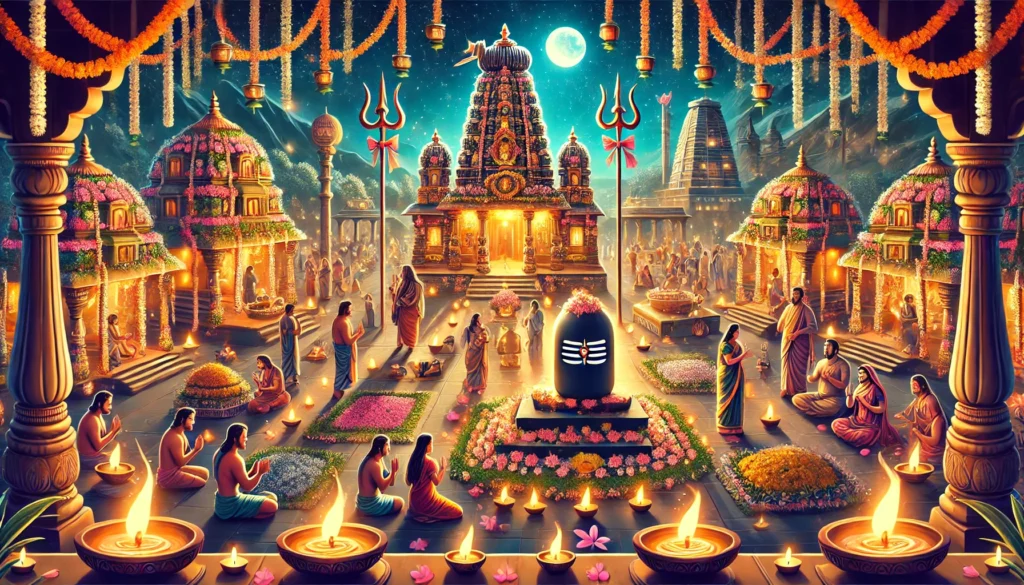
Maha Shivratri, also known as the “Great Night of Shiva,” is one of the most significant festivals dedicated to Lord Shiva, the Hindu god of transformation and destruction. Celebrated on the 14th day of the dark fortnight in the month of Phalguna (usually February or March), Maha Shivratri is an occasion for intense devotion, reflection, and spiritual renewal. This night-long festival symbolizes the cosmic dance of creation and destruction and is observed by millions of devotees through rituals, fasting, and meditation.
The Spiritual and Mythological Significance of Maha Shivratri
The significance of Maha Shivratri lies in its deep spiritual symbolism and mythological roots. According to Hindu mythology, Maha Shivratri marks the day when Shiva performed the Tandava, his cosmic dance symbolizing the cycle of creation, preservation, and destruction. This dance represents the eternal rhythm of life and the universe’s transformative power, reminding devotees of Shiva’s role in maintaining balance in the cosmos.
Another popular legend associates Maha Shivratri with the divine marriage of Lord Shiva and Goddess Parvati. It is believed that Parvati prayed for many years to win Shiva’s heart, and their union on Maha Shivratri represents the merging of energies — the balance of masculine and feminine, destruction and creation. This day, therefore, is celebrated not only as a time of devotion to Shiva but also as a reminder of the importance of balance and harmony in life.
Maha Shivratri is also said to be the night when Shiva drank the poison Halahala, which emerged during the churning of the cosmic ocean, Samudra Manthan. To save the world, Shiva consumed the poison, which turned his throat blue, earning him the name Neelkanth (the blue-throated one). This act of selflessness is commemorated on Maha Shivratri, symbolizing the triumph of self-sacrifice and protection for the greater good.
How Maha Shivratri is Celebrated
The observance of Maha Shivratri is unique compared to other Hindu festivals, as it emphasizes night-long devotion, fasting, and meditation rather than festive decorations or grand celebrations. Devotees begin their day with a ritual bath, often in sacred rivers or at home, to purify the body and mind before engaging in prayers. They observe a fast throughout the day, abstaining from food or consuming only fruits and milk, as an act of devotion and self-control.
The central element of Maha Shivratri is the worship of the Shiva Linga, a representation of Lord Shiva’s formless, infinite power. Temples are adorned with flowers and lights, and devotees offer water, milk, honey, and bilva (bel) leaves to the Shiva Linga, chanting the mantra “Om Namah Shivaya.” This mantra is believed to have profound spiritual energy, invoking Shiva’s blessings for peace, wisdom, and liberation from the cycle of rebirth.
Throughout the night, devotees participate in kirtans (devotional singing), listen to stories of Shiva’s divine acts, and meditate on his qualities of courage, compassion, and detachment. Many devotees stay awake all night, engaging in prayers and meditative practices to seek spiritual awakening and inner peace. It is believed that staying awake on this auspicious night can help devotees overcome ignorance and move closer to self-realization.
The Relevance of Maha Shivratri Today
In today’s fast-paced world, Maha Shivratri serves as a moment of introspection and spiritual alignment. It encourages individuals to detach from worldly concerns and focus on inner growth, self-discipline, and mindfulness. The night-long vigil and fasting practices promote self-restraint and control over desires, fostering a sense of clarity and purpose.
For many, Maha Shivratri is an opportunity to reflect on the deeper aspects of life and experience a connection with the divine. The themes of transformation and destruction inherent in the festival remind us of the transient nature of life and the importance of detachment. Through this celebration, people are inspired to rise above negative tendencies, just as Shiva consumed the poison, and embrace positive qualities that lead to inner peace.
Maha Shivratri is more than a religious festival; it is a call to awaken to higher consciousness and celebrate the transformative power within each individual. The rituals, fasting, and all-night devotion of Maha Shivratri offer devotees a unique chance to align with Shiva’s energy, seeking blessings for peace, strength, and spiritual growth. It is a timeless festival that highlights the journey toward self-realization and the importance of resilience and compassion on the spiritual path.



